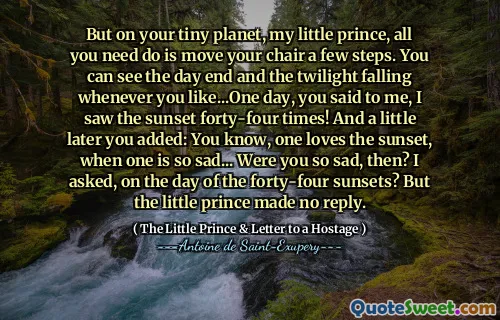"The Little Prince," a classic by Antoine de Saint-Exupéry, tells the tale of a young prince who travels from his tiny asteroid to different worlds, where he meets various inhabitants. Through these encounters, he learns about love, loss, and the essence of true friendship. The book highlights the innocence of childhood and critiques the adult world's superficiality, emphasizing the importance of seeing beyond appearances. The prince's relationship with a rose symbolizes love that requires care and responsibility, teaching readers profound lessons about connection and understanding.
"Letter to a Hostage" by Antoine de Saint-Exupéry is a poignant reflection on the nature of human relationships during turbulent times. Written during World War II, this work serves as a heartfelt message to a friend and demonstrates the power of hope amidst chaos. Saint-Exupéry contemplates themes of freedom, sacrifice, and the personal toll of conflict. He articulates a longing for connection and the struggle to maintain humanity in the face of adversity, encouraging readers to reflect on their values and the importance of solidarity.
Both works showcase Saint-Exupéry's literary brilliance and deep philosophical insights. "The Little Prince" uses allegory and whimsy to explore complex emotional truths, while "Letter to a Hostage" offers a more direct meditation on war's impact on human life. Together, these texts invite readers to consider the significance of love, selflessness, and the bonds that hold humanity together, regardless of external circumstances. They remain timeless, resonating with audiences seeking meaning and connection in a fragmented world.
More »
Today Birthdays
1729 -
Edmund Burke
1949 -
Haruki Murakami
1954 -
Howard Stern
1876 -
Jack London
1993 -
Zayn Malik
1951 -
Kirstie Alley
1863 -
Swami Vivekananda
1923 -
Alice Miller
1987 -
Naya Rivera
1825 -
Brooke Foss Westcott
1944 -
Joe Frazier
1951 -
Rush Limbaugh
1964 -
Jeff Bezos
1978 -
Jeremy Camp
1628 -
Charles Perrault
1856 -
John Singer Sargent
1970 -
Kaja Foglio
1953 -
Rick Santelli
1986 -
Gemma Arterton
1968 -
Raf Simons
1958 -
Christiane Amanpour
1966 -
Olivier Martinez
1996 -
Ella Henderson
1917 -
Maharishi Mahesh Yogi
1949 -
Ottmar Hitzfeld
1928 -
Ruth Brown
1968 -
Heather Mills
1946 -
George Duke
1968 -
Rachael Harris
1923 -
Ira Hayes

